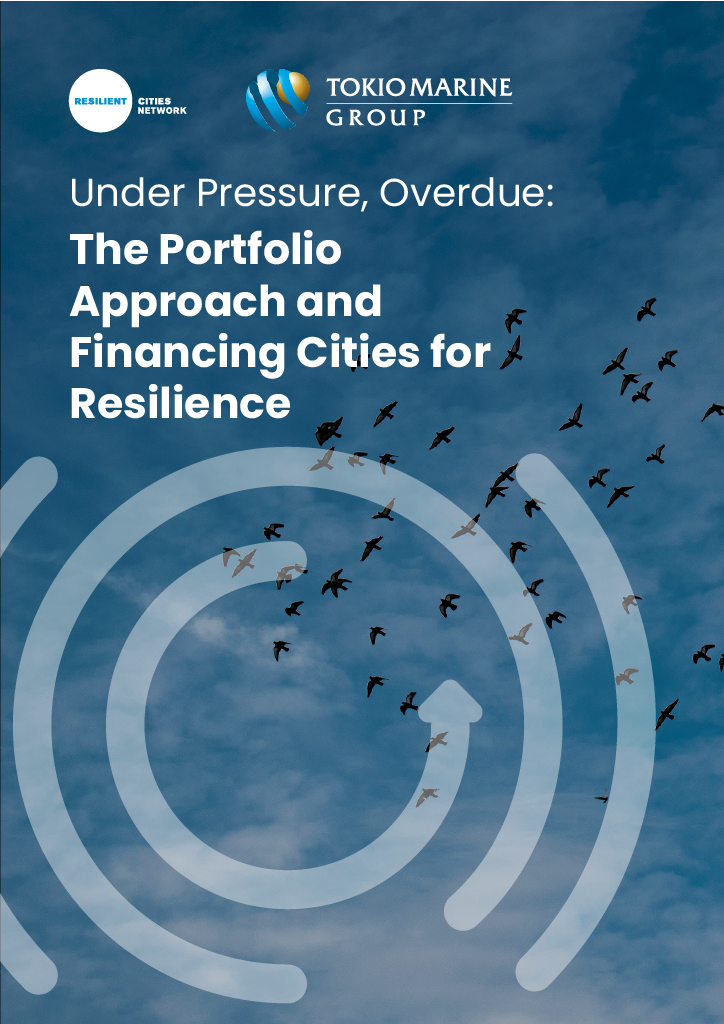Cities are already paying the price of inaction: insurance premiums are increasing, homes and businesses are becoming more challenging to insure, and capital is beginning to move elsewhere. A new report from Resilient Cities Network and Tokio Marine Group warns that without a major shift in how cities finance resilience, many risk economic decline and even disinvestment.
The report, “Under Pressure, Overdue: The Portfolio Approach and Financing Cities for Resilience”, highlights the widening protection gap – the growing distance between climate losses and what insurance actually covers – which leaves households and cities dangerously exposed.
The report highlights several existing pathways that cities have followed to address rising premium costs and incorporate resilience into development and investment strategies. For example, in Broward County, Florida, recurring flooding pushed premiums up by more than 400%, pushing officials to model the economic impact, providing evidence that flood defenses could deliver a return of at least 9%. Seeing the potential economic impact, local businesses even backed new funding mechanisms.

A further example highlighted in the report showcases steps taken in Cape Town, South Africa, where resilience has been embedded into governance, with a continuous focus on delivery of key targets, backed by audits and transparent reporting. This credibility helped the city secure international financing and an upgraded credit rating.
Focusing on finance for resilience and net zero transitions, the report looks at an additional example of Canada’s Green Municipal Fund (GMF), part of the Federation of Canadian Municipalities (FCM), which provides grants, loans and capacity building programs to support municipalities in initiatives that build greater resilience and take steps towards becoming net zero at a city-level.
Since its inception in 2000, the GMF has approved over 2,300 projects worth $1.6 billion CAD. By providing grants and loans to de-risk projects, it has brought in over $75 million CAD in private sector capital.
“This is not just about strengthening infrastructure,” said Lina Liakou, Managing Director of Resilient Cities Network. “By shaping resilience portfolios that attract private capital, we are making resilience practical, measurable and investable.”
The findings come just weeks ahead of COP30 in Belém, where global climate finance will be under negotiation, underscoring the urgency for cities to act.
The Portfolio Approach set out in the report defines six practices that make this possible: holistic planning, stakeholder coordination, capital allocation, data-driven strategies, project management, and transparency. Together they provide the structure that investors, insurers, and communities need to mobilize resources at scale.
“Insurance must go beyond payouts,” said Brad Irick, Group CEO of Tokio Marine. “By partnering with cities from the start, we can help price and reduce risk, mobilize capital, and protect long-term economic competitiveness.”
With global climate finance negotiations intensifying, the report’s message is clear: shared risks require shared investment. Cities, financiers, and insurers must act together now to secure the resilience of communities and economies. The economic imperative for investing in resilience will be demonstrated through piloting the Portfolio Approach with cities worldwide.
“In order to meet the resilience challenge, cities need to plan and prepare projects over much longer time horizons. The portfolio approach provides robustness and agility to city infrastructure development, and is attractive to investors, lenders and donors,” said Gareth Morgan, Executive Director of Future Planning and Resilience, City of Cape Town.
“From case studies, we draw practical lessons on how cities, companies, financiers and tech enablers deliver adaptation and resilience solutions that strengthen urban systems. Our goal is a pragmatic approach for moving from theory to action, built to attract and scale private sector capital” said Sadiq Currimbhoy, Lead Author and Head of Sustainability, Vulpes Investment Management.
“Broward County’s portfolio-based approach to resilience planning reflects a process of co-development involving the public and private sectors. It was clear that while the business community was supportive of resilience planning in general, their ability to endorse a large-scale plan requiring sizable financing would hinge on the county’s ability to produce a plan that delivered on both flood risk and economic metrics. Today, the County’s Resilience plan is affectionately referred to as the required ‘blueprint’ needed to carry our community forward as we work as partners to build support for its implementation, across all levels of government, involving the broader field of private sector stakeholders, and throughout the community,” said Jennifer Jurado, Chief Resilience Officer of Broward County, Florida.
About Resilient Cities Network
Resilient Cities Network is the world’s leading urban resilience network. It brings together global knowledge, practice, partnerships, and funding to empower its members to build safe and equitable cities for all. Its unique city-led approach ensures cities drive the agenda to benefit the communities they serve. At work in over 100 cities worldwide, the Resilient Cities Network supports on-the-ground projects and solutions to build climate resilient, circular and equitable cities while also facilitating connections and information-sharing between communities and local leaders.
More information can be found here: https://resilientcitiesnetwork.org/
About Tokio Marine Group
Tokio Marine Group is one of the world’s largest global insurance and risk players with a market capitalization of $73 billion as of June 30, 2024, a network encompassing Japan and 46 countries & regions worldwide, and over 43,000 employees. Tokio Marine Group has the capabilities to drive genuine positive change through a business model grounded in a sense of purpose and social responsibility, built on 145 years of history and an enduring culture that fosters innovation and expertise.
Composed of a diverse range of insurance and solutions businesses across the world that bring a depth and breadth of capabilities to address and mitigate the ever-evolving risks we face, we provide our clients and communities with the security they need to move forward, while working to create more resilient societies and a better tomorrow.
More information can be found here: https://www.tokiomarinehd.com/en/
